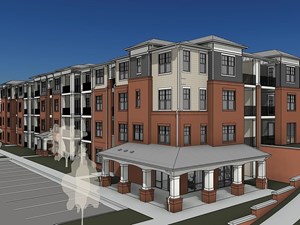The City of Atlanta, together with affordable housing developers Atlanta Neighborhood Development Partnership and Laurel Street Residential, has begun work on Creekside at Adamsville Place, a 147-unit development geared toward households with incomes at 30, 60 and 80 percent of the area’s median income. The $27.6 million, Corcoran Ota Group-designed project is expected to be completed by fall 2020.
Located immediately south of Interstate 20 in the Adamsville neighborhood, the three-story community is slated to include one- to three-bedroom apartments. Plans also call for amenities such as a community room, gathering area, business center, fitness center, laundry facilities, playground, outdoor seating areas and pavilion.
Financing for the project includes four percent low-income housing tax credits from the Georgia Department of Community Affairs, tax-exempt bonds and housing opportunity bonds from Invest Atlanta as well as an FHA 221(d)(4) loan from the U.S. Department of Housing & Urban Development. Red Capital is providing first mortgage financing and RBC Bank is the federal and state equity investor.
“In today’s market, creating new affordable housing is a team sport. Without critical support from Invest Atlanta and Georgia Department of Community Affairs, our partnership with Laurel Street Residential would not have had the resources to make this happen,” said ANDP President & CEO John O’Callaghan for Multi-Housing News. “We are now completing a community that is home to senior living, a health care facility, a neighborhood school and will now include 147 units of affordable family apartment homes.”
Creekside at Adamsville Place is part of a 45-point plan that aims to increase the supply of housing in the metro for low-income residents. Atlanta Mayor Keisha Lance Bottoms released the City of Atlanta Housing Affordability Action Plan, a document that mentions the metro’s key goal: to create or preserve more than 20,000 affordable homes by 2026.
In order to achieve their objective, local authorities intend to leverage vacant public land for housing, create and expand housing affordability tools, revise the zoning code, develop new funding sources and increase philanthropic and private investment in affordable housing. Minimizing displacement, supporting innovation and streamline processes are also among officials’ goals. Atlanta plans to invest $1 billion from public, private and philanthropic sources in the production and preservation of affordable housing during the next few years.

